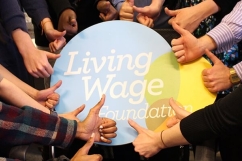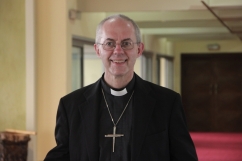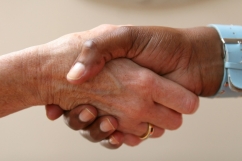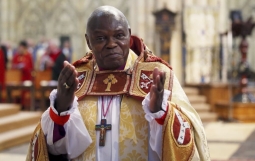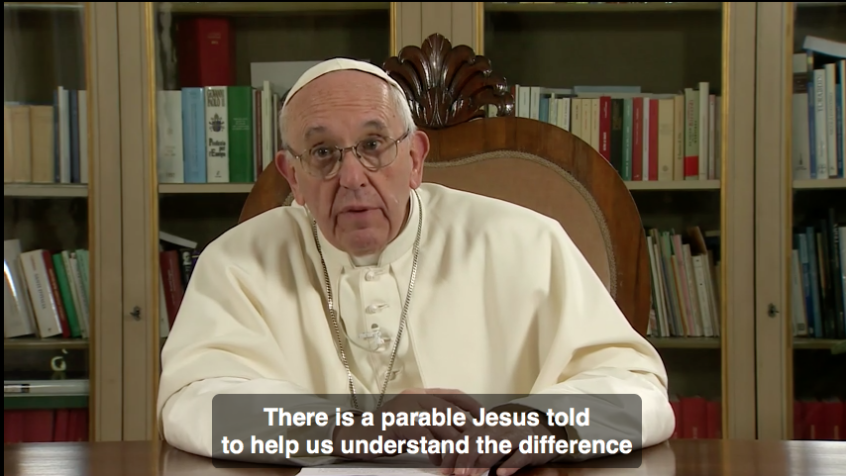
It was only a matter of time for one of the most high profile figures in the world, a great communicator and a man whose embrace of new technology has helped him reach many outside of the traditional boundaries of his ancient institution.
Yes, Pope Francis has done a TED Talk.
The TED phenomenon, which has been growing ever wider for the last decade or so, sees experts in a certain field present their ideas in short-format videos which can then be easily shared across social media.
As part of a TED event called 'The Future You' the Pontiff addressed the audience on a variety of themes. Among them was plenty of the simple and profound wisdom we've become used to from the former Cardinal Bergoglio. Talking about the need for 'equality and social inclusion' as science and technology advances, the Pope appealed for solidarity among individuals, peoples and countries.
He stressed the profound Christian insight that relationships are vital, that humans deeply affect each other's lives and that no person is an island. Drawing on his interactions with migrants and the sick and elderly, the Pope spoke plainly and said, 'we all need each other.' Amen to that! Channelling the Good Samaritan, he talked about Christian hope and light overcoming darkness.
Yet, the most prescient part of his talk was about power. Having identified and highlighted so many of the problems in the world, the Pope warned politicians about the dangers of power. 'The more powerful you are, the more your actions will have an impact on people, the more responsible you are to act humbly,' he said. It was almost as if he'd been watching the beginning stages of the UK general election. 'If you don't, your power will ruin you and you will ruin the other,' he continued.
The Pope wasn't finished, though. He went on to draw on his heritage, 'There is a saying in Argentina: "Power is like drinking gin on an empty stomach". You feel dizzy, you get drunk, you lose your balance and you will end up hurting yourself and those around you.'
The Pope's rebuke to power-hungry politicians is nothing that hasn't been said before in Catholic Social Teaching but it does point a way forward to us in the midst of a deeply divisive election campaign in the UK and the continued acrimony of the last presidential campaign in the US.
'Through humility and concrete love, on the other hand, power...becomes a service, a force for good,' said the Pope before receiving a standing ovation for his address.
Here, the Pope is recognising one of the central insights of political life. If you want something to change, then you're going to need to have power. Christians can be nervous about this. Power is often seen as a dirty word, or even something evil, too worldly.
Yet this is a misunderstanding of power. Power comes in two kinds – power with people and power over people. Christians will rightly oppose the politician who wants to achieve power over others. But we mustn't be scared of taking power alongside others, for the common good.
The Pope's example is a good one. The Good Samaritan was only able to look after the injured man because he had the means to do something about it. In that situation he used his power to assist someone else.
Power itself is not the problem. Where the power lies is the problem. As the theologian Luke Bretherton has written, 'States concentrate power in hands of bureaucrats, while markets concentrate power in the hand of plutocrats, while both concentrate resources in the hands of technocrats, thereby de-skilling us and stripping us of the agency through which we can solve our own problems.'
The answer is not simple. But it lies not in eschewing power, but in acquiring it, sharing it and using it well. Former Archbishop of Canterbury William Temple said: 'It has to be recognised that society is made up of competing centres of power, and that the separate existence of contending vitalities, and not only human sinfulness, make the elimination of power impossible. What has to be aimed at is such a distribution and balance of power that a measure of justice may be achieved.'
So what now, as we face deep political division and the prospect of people grasping for power? 'The future is, most of all, in the hands of those people who recognise the other as "you" and themselves as part of an "us", says the Pope. That's a good place to start on the journey to getting power in its right place.










